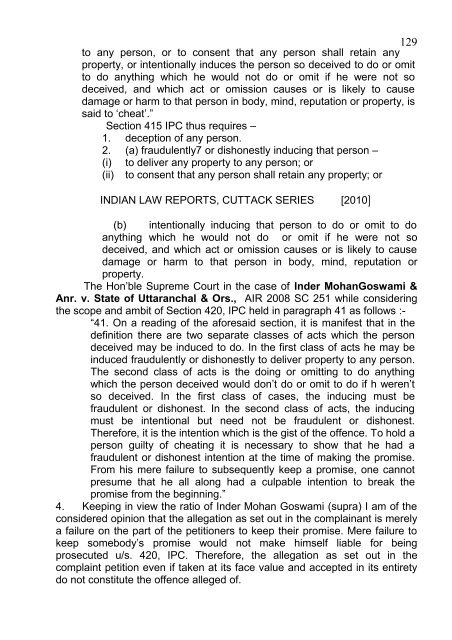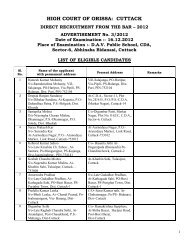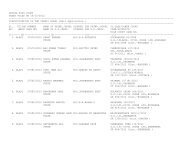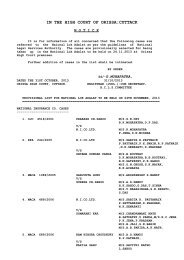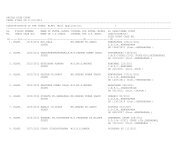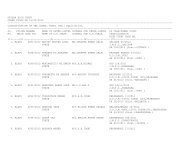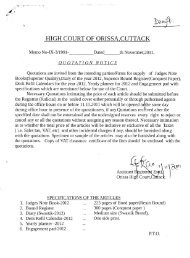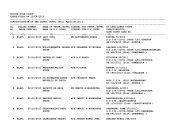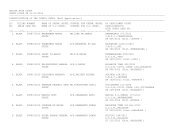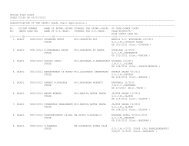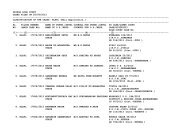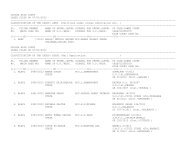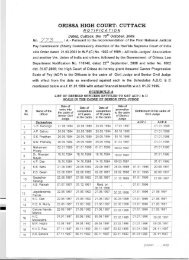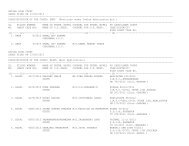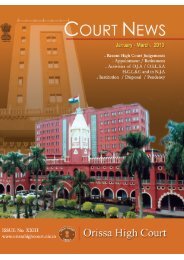ORIGINAL JURISDICTION - Orissa High Court
ORIGINAL JURISDICTION - Orissa High Court
ORIGINAL JURISDICTION - Orissa High Court
You also want an ePaper? Increase the reach of your titles
YUMPU automatically turns print PDFs into web optimized ePapers that Google loves.
129<br />
to any person, or to consent that any person shall retain any<br />
property, or intentionally induces the person so deceived to do or omit<br />
to do anything which he would not do or omit if he were not so<br />
deceived, and which act or omission causes or is likely to cause<br />
damage or harm to that person in body, mind, reputation or property, is<br />
said to ‘cheat’.”<br />
Section 415 IPC thus requires –<br />
1. deception of any person.<br />
2. (a) fraudulently7 or dishonestly inducing that person –<br />
(i) to deliver any property to any person; or<br />
(ii) to consent that any person shall retain any property; or<br />
INDIAN LAW REPORTS, CUTTACK SERIES [2010]<br />
(b) intentionally inducing that person to do or omit to do<br />
anything which he would not do or omit if he were not so<br />
deceived, and which act or omission causes or is likely to cause<br />
damage or harm to that person in body, mind, reputation or<br />
property.<br />
The Hon’ble Supreme <strong>Court</strong> in the case of Inder MohanGoswami &<br />
Anr. v. State of Uttaranchal & Ors., AIR 2008 SC 251 while considering<br />
the scope and ambit of Section 420, IPC held in paragraph 41 as follows :-<br />
“41. On a reading of the aforesaid section, it is manifest that in the<br />
definition there are two separate classes of acts which the person<br />
deceived may be induced to do. In the first class of acts he may be<br />
induced fraudulently or dishonestly to deliver property to any person.<br />
The second class of acts is the doing or omitting to do anything<br />
which the person deceived would don’t do or omit to do if h weren’t<br />
so deceived. In the first class of cases, the inducing must be<br />
fraudulent or dishonest. In the second class of acts, the inducing<br />
must be intentional but need not be fraudulent or dishonest.<br />
Therefore, it is the intention which is the gist of the offence. To hold a<br />
person guilty of cheating it is necessary to show that he had a<br />
fraudulent or dishonest intention at the time of making the promise.<br />
From his mere failure to subsequently keep a promise, one cannot<br />
presume that he all along had a culpable intention to break the<br />
promise from the beginning.”<br />
4. Keeping in view the ratio of Inder Mohan Goswami (supra) I am of the<br />
considered opinion that the allegation as set out in the complainant is merely<br />
a failure on the part of the petitioners to keep their promise. Mere failure to<br />
keep somebody’s promise would not make himself liable for being<br />
prosecuted u/s. 420, IPC. Therefore, the allegation as set out in the<br />
complaint petition even if taken at its face value and accepted in its entirety<br />
do not constitute the offence alleged of.


